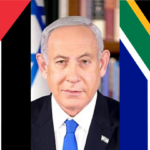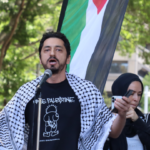Australian Law Firm Files Case Against PM for Complicity in Gaza Genocide

Australian PM Anthony Albanese was referred to the International Criminal Court in a communiqué presented to ICC prosecutor Karim Khan KC on Monday.
The nation’s leader stands accused as an accessory to the genocide occurring in the Gaza Strip, as do key members of his cabinet and Australian parliament.
This makes our PM the first leader of a western nation to have been referred to the ICC for prosecution, under article 15 of the Rome Statute. And he’s also the first western leader to be implicated at the international level as complicit in the plausible genocide that’s taking place in Gaza.
The claim has been brought by Australian law firm Birchgrove Legal, and it is led by barrister Sheryn Omeri KC.
Lawyers behind proceedings
Over 100 lawyers are in support of it, and a collective sigh of relief was uttered amongst the local antiwar movement as the case was announced on ABC News Breakfast early Tuesday morning.
The claim charges Albanese, foreign minister Penny Wong and others with aiding genocide via the cutting of funding to UNRWA, the main aid channel into Gaza, while ambiguously deploying a military contingent, permitting Australians to fight for Israel and providing unequivocal support to it.
And the 92-page document contains pages of evidence to support these claims, as the lawyers involved have “spent months documenting the alleged complicity and outlining the individual criminal responsibility of Mr Albanese in respect to the situation in Palestine”.
Turning up the heat
The document accuses Australian nationals with accessory to genocide, especially in terms of article 25(3)(c) of the Rome Statute, which involves individual criminal responsibility for aiding and abetting genocide, and under article 25(3)(d), as in having knowingly contributed to the crimes of others.
This claim is being made against the backdrop of South African lawyers having taken Israel to the International Court of Justice, charging it with genocide. And the ICJ found that the nation is plausibly perpetrating genocide and ordered it to halt genocidal actions and increase aid into Gaza.
Right now, over 30,000 of the 2.3 million Palestinians living in Gaza have been destroyed by military weapons or starved to death, and when taking in the number of local injured by Israeli Defence Forces, the figures further skyrocket to surpass 100,000 people.
Since 7 October 2023, the document states, the Australian government and individual ministers and political figures, such as PM Anthony Albanese, foreign minister Penny Wong, defence minister Richard Marles and Liberal leader Peter Dutton, have provided suspect support to the Israeli regime.
This has taken the form of “explicit political, rhetorical, moral, military and material support for Israel’s genocidal attack,” it continues, “despite their indisputable knowledge of the extent of the violent attacks”, and that includes providing political cover for Israel at international forums.
Backing the genocide
The Conduct of Members of the Parliament of Australia, in Relation to the Situation in Gaza, Palestine: Accessorial Liability for Genocide document details how the five-month-long massacre in Gaza constitutes a genocide, along with long-term Australian support for Israel in these matters.
And it notes that the ICJ finding triggered the requirement within the Convention on the Prevention and Punishment of the Crime of Genocide that requires all state parties, like Australia, to take all possible measures to actively halt a genocide. And the lawyers outline how this has been ignored.
Rather, the document further sets out that due to this responsibility several human rights and legal organisations have warned government to cease military exports, demand an immediate ceasefire, stop political support and to increase aid into Gaza. Yet, this has received a dearth of attention.
Annexure A of the document lists specific instances where senior Australian politicians, in both their professional and personal capacities, have stated support for Israel, as it has been expressing genocidal intent in terms of its military assault on Gaza.
PM Albanese has four instances listed. Deputy PM Marles has three. Foreign minister Wong has expressed such sentiment four times, home affairs minister Clare O’Neil once, government services minister Bill Shorten has done so once, and Liberal leader Dutton has four instances to his name.
The document further outlines that Australia has sent 322 defence exports to Israel since 2017, “including 49 permits for Israel-bound exports in 2022 and… in the first three months of 2023, which can cover military-specific goods and also dual-purpose devices.
Omeri told the ABC that the chief way in which Australia has been complicit in the Israel perpetrated massacre in the Gaza Strip is via parts supplied to the Lockheed-Martin F-35 plane program, as well as with surveillance information gathered at the Joint Defence Facility Pine Gap in central Australia.
Canberra bubble crims
The case against the government charges the abovementioned ministers with aiding and abetting the Gaza genocide, via encouragement. It claims Australia is complicit as it has cut funding to UNRWA, and, as this nation has a history of supporting Israel, such support has a legitimising effect.
Article 6 of the Rome Statute presents the elements of the international crime of genocide, which consist of attempting to destroy, in part or in whole, members of a group, via killing, serious bodily or mental harm, inflicting destructive conditions, preventing birth and forcibly removing children.
The ICJ ruled genocide is plausibly taking place on 26 January, in terms of all the elements, except for child removals. And Australian minister complicity in Israel’s ongoing atrocity triggers article 25 of the Rome Statue, which involves individual criminal responsibility.
Entering into force in July 2002, the Rome Statute of the International Criminal Court establishes its universal jurisdiction and the four core international criminal offences of genocide, crimes against humanity and war crimes since its inception, and the crimes of aggression, since 2010.
And as required the first three core offences were, as the statute requires, enacted domestically under division 268 of the Criminal Code Act 1995 (Cth) in September 2002, and these offences have universal jurisdiction, meaning they can be applied to anyone anywhere.
Taking it to the top
However, as a press release accompanying the document explains, in this country, “a prosecution for international crimes cannot be brought without the endorsement and support of the attorney general which poses a significant conflict of interest”.
This block on the prosecution of atrocity crimes is known as the attorney general’s fiat, and it sits under sections 268.121 and 268.122 of the Criminal Code Act 1995 (Cth): the first section provides the chief lawmaker can reject a case, and the latter provides that such a decision can’t be reversed.
Senator Lidia Thorpe recently introduced her Criminal Code Amendment (Genocide, Crimes Against Humanity and War Crimes) Bill 2024, which seeks to remove the AG’s fiat, so that the bias of any incumbent chief lawmaker does not serve to prevent justice when prosecuting international crimes.
The Gunnai Gunditjmara and Djab Wurrung senator explained in her second reading speech that “unless governments commit and choose to be held, and hold others accountable, crimes against humanity, genocide, war crimes, suffering and mass death will happen again, over and over again”.
“The ICC is a court of last resort,” the lawyers’ case against Albanese and company makes clear. “It will prosecute international crimes where state parties to the Rome Statute, such as Australia, are either unable to do so themselves or have shown themselves to be unwilling to do so.”
In terms of South Africa taking its genocide claim to the ICJ and the Australian lawyers taking theirs to the ICC, the reason for the different courts is that the court of justice tends to settle disputes regarding states, while the criminal court prosecutes individuals over atrocity crimes.
But regardless of whether the case is progressed, or any prosecution results in convictions, the statement made about this nation and its political elite via the filing of the genocide complaint, is already impacting perceptions of those implicated, both locally and at the international level.







